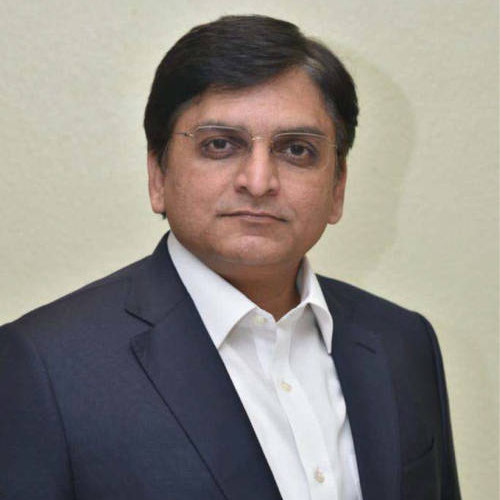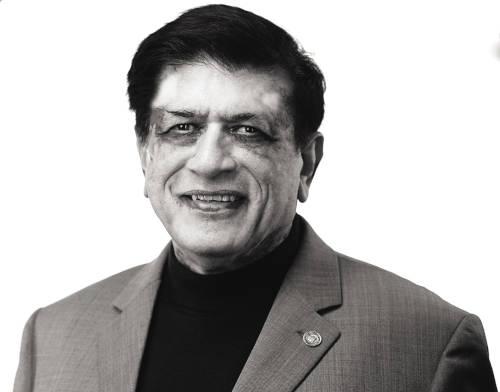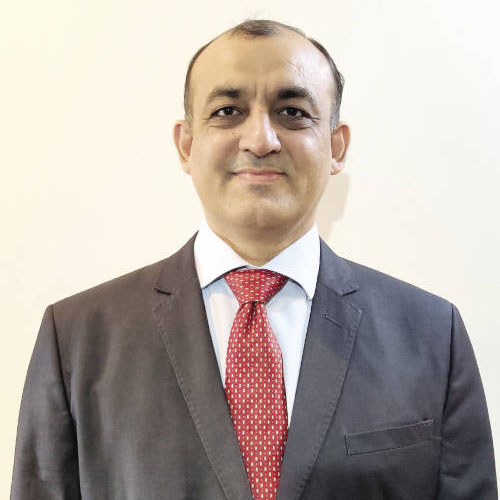-

Desai: 'We create unique, high-value products'
So it comes as no surprise that Anupam Rasayan has evolved as a key player in India’s chemical industry, so much so that it stands out as the jewel in India’s chemical crown. This adage is well-earned. From FY21 to FY23, the company’s revenue has nearly doubled jumping from Rs811 crore to Rs1,602 crore.
There’s more to the story. Profits did even better. They went up three times, reaching Rs217 crore. The company stands out for its heavy investment in research. Right now, it’s working on more than 90 new products. Each year, ARIL plans to launch 6-8 new molecules, which should keep its growth wheels chugging nicely for the next few years.
“Our journey has been strong and rewarding, to say the least. Doubling our revenue and tripling our profits are signs that we are on the right track. But what excites me more is our pipeline of over 90 new products. We have made great strides, but given our pipeline and strength in research and our innovative manufacturing process, we see plenty of potential in the coming years,” says Vishal Thakkar, deputy CFO, ARIL.
A proven track record
ARIL’s journey actually started from a humble plant in Sachin as an import substitution company in the first government-approved chemicals zone in Surat. ARIL started its business by manufacturing products which were largely imported. ARIL focused on forward integration and expanding its market to drive growth. Soon it added more chemicals and focussed on innovative manufacturing processes, while it expanded its product marketing to other South Asian customers.
When a key customer from Indonesia exited the market in 1997, ARIL adapted and shifted focus toward exports to other countries while simultaneously widening its product range. Over the years, its roster expanded from two to 53 products. In 2013 and 2016, investment in ARIL from Milan Thakkar and Dr Kiran C Patel turned out to be inflection points. Revenue expanded at a rapid 30-36 per cent annually while profits averaged 25-28 per cent in the ensuing years.
“However, we focused on offering unique products that differentiated us from commodities. This approach allowed us to charge a slightly higher premium, around 20 per cent, as we demonstrated our manufacturing capabilities. We have maintained a customer-centric approach, where every product is tailored to a specific customer’s needs,” says Desai.
For the past 5 years, Dr Kiran Patel, a renowned Indian-American cardiologist turned entrepreneur, has been associated with Anupam Rasayan as the Chairman, and has provided guidance and support to the company. Dr Patel has been actively involved in investing in and supporting start-ups and early-stage businesses in India and around the world, offering valuable guidance during their growth phase.
He played a crucial role in Anupam Rasayan’s transition to a publicly traded company. In March 2021, the company went public with a valuation exceeding $750 million, driven by a total capital infusion of $110 million from Dr Patel, which began in 2016.
“I am deeply grateful to our invaluable stakeholders and partners for their unwavering support, which has been instrumental in shaping our company’s growth story. Since our stock market listing in 2021, they have demonstrated faith in our shared vision and contributed steadfastly to our progress. The journey of Anupam Rasayan has been a testament to our resilience and unwavering commitment to excellence. Through prioritising innovation and quality, we have expanded our portfolio and enhanced our capabilities, positioning ourselves as a preferred global partner. Our growth and profitability stem from our focus on adopting cutting-edge technologies and optimising our processes, enabling us to specialise in custom synthesis and complex chemistries,” says Patel.
-

Patel: providing guidance
“As we continue to prioritise research and development, our highly skilled team of researchers remains dedicated to advancing complex chemistries and achieving self-sustainability in our operations. We are also proud of the economic progress we have achieved, as demonstrated by our acquisition of Tanfac Industries Limited, which has bolstered our presence in the fluorination business and contributed to our strong profitability, dynamism, and performance. Our forward-looking investments not only aim to reduce operating costs but also deliver more sustainable products to our consumers. We are committed to environmental sustainability and have made significant strides in reducing our dependence on fossil fuels. The installation of a solar plant in Bharuch has cut down on production costs and also increased our yield of renewable energy, surpassing industry standards. Embracing our social and human responsibilities, we prioritise the well-being of our workforce and uphold the core values of Anupam Rasayan. With our diversified portfolio, sustainable practices, and a fervent passion for innovation, we are poised to embark on a successful future,” adds Kiran Patel, as chairman of ARIL.
Backed by R&D, ARIL’s in-house innovation enables the firm to develop proprietary manufacturing processes, which target greater efficiencies in complex chemistries. ARIL also invested heavily in research and development 6 years ago for fluorination, a complex process that requires specific agents with further unique challenges in product transportation. The country has four manufacturers of HF (hydrochloric acid).
Despite initial difficulties, ARIL pressed on and commercialised several products. As a result, fluorination chemistry now represents 12-15 per cent of ARIL’s revenue. Further, it invested heavily, including in developing two fluorination-focused plants, a backward-integration plan. The move provided supply security but also strategic value addition due to the limited number of manufacturers in fluorination.
Another one of ARIL’s key innovations is the implementation of flow chemistry. Unlike traditional chemistry which operates in batches, flow chemistry is a continuous process. Similar to refineries, reactions occur precisely in milligrams per second. This significantly increases the precision and safety of the reaction as it occurs on a small scale inside a reactor.
The company’s customer roster boasts big names in chemicals such as Syngenta, Sumitomo Chemicals, DuPont, UPL, Adama and many more. These multinational corporations choose ARIL as a trusted partner. This underscores the company’s ability to maintain product confidentiality and adhere to the rigorous manufacturing registration required by regulatory bodies.
ARIL has also built more capabilities in its manufacturing process through acquisitions, thus expanding its platform to include more varied and nuanced chemicals-manufacturing solutions. It acquired Corning’s flow reactors in 2015, a leader in manufacturing flow chemistry equipment. ARIL was the first in Asia to be able to tap into the world of advanced chemical reactions, which require extremely high temperatures or pressures, thus strengthening its research and development process.
Strategic acquisition
It also recently acquired 24.96 per cent of Birla Group Holdings’ equity shareholding of Tanfac Industries. Tanfac is a specialty fluoride chemicals manufacturer and a leading producer of hydrochloric acid HF. Its production base includes organic and inorganic fluorine-based products such as aluminium fluoride, sodium silico fluoride, KF, sulfuric acid, and Oleum.
The acquisition is a good move on ARIL’s part, giving it direct access to raw materials for its fluorination-based products such as hydrogen fluoride (HF) and potassium fluoride (KF). This type of backward integration is a strategic approach to secure the supply chain and reduce dependence on external sources.
-

Moreover, Tanfac’s manufacturing capacities only strengthen ARIL’s manufacturing base. With aluminium fluoride (ALF) capacity of 15,600 mtpa, anhydrous hydrofluoric acid (AHF) capacity of 15,600 mtpa, sulphuric acid capacity of 82,500 mtpa, and specialty fluorides capacity of 8,400 mtpa, Tanfac Industries is more than an ally to ARIL.
With this acquisition, ARIL can enter new product derivatives based on hydrofluoric. At present, 15 per cent of ARIL’s business is based on KF derivatives, and there are clear ambitions to expand this segment further. Also, ARIL plans a significant capex investment of over Rs400 crore for fluorine derivatives.
Besides, there’s more room in the company. At present, Tanfac is working at around 70 per cent capacity and ARIL aims to bring in new products that would be ground-breaking in India. “Initially, people did not realise Tanfac’s true potential, but gradually they began to understand its value. In August, when we presented our business plan to investors, they were genuinely pleased. They recognised the uniqueness of our overall approach and for Tanfac,” says Desai.
Little surprise then, that with all its forays and research base, ARIL has built a formidable product pipeline. “Today if you look at the whole investment, that translates to 53 products from launch. We have 90 more in the pipeline, for which we examined more than 300 products. We will be launching 10 molecules this financial year. Our portfolio will expand 20 per cent in terms of offerings in the coming year,” adds Desai.
Its strong technical capabilities in complex chemicals are supported by a research and development team of 88 professionals. It comes as no surprise that the firm has ambitious goals in molecules, products, client expansion and the resultant revenue and profitability enhancement.
Sticky customer base
Further, in an industry where product confidentiality is paramount, customers prefer to limit the number of suppliers they work with. ARIL has made this its unique advantage, helping build long-term relationships with customers. As a result, it built long-term sales in its contracts that run from 2-5 years. While this has resulted in high customer concentration, with revenue from the top 10 bringing more than 80 per cent of the business, it also provides strong revenue assurance once the company bags a contract and starts delivering products.
“Anupam Rasayan possesses an unparalleled advantage in seizing the burgeoning demand for contract research and manufacturing services (CRAMs) and fluorination chemistry. It boasts a robust line-up of molecules, particularly within the sphere of fluorine chemistry, which positions it favourably in the market. We firmly believe that its unwavering commitment to developing value-added products, coupled with its robust margin profile, will serve as pivotal catalysts to propel revenue and profitability. Furthermore, the company’s substantial contracts and letters of interest provide exceptional clarity and assurance regarding future revenue,” says Abhishek Agarwal, research analyst at KR Choksey.
Besides, the shifting tides in global business present new opportunities. Multinational corporations are diversifying their sourcing strategies, moving away from dependence on China. This is the sole reason why companies like ARIL find themselves in a strong position.
Global chemical manufacturers also recognise the potential in low-cost countries and the quality of their chemists and scientists. For global companies, this is not only de-risking their supply chains but they also benefit from the contract research and manufacturing services (CRAMS) that companies from India provide. Even so, geopolitical events such as the Russia-Ukraine war have also caused disruptions to global supply chains. In other words, it’s advantage ARIL.
-

Thakkar: we believe in simple things
“We view ARIL as a direct beneficiary of the global outsourcing boom, and the government’s focus on ‘Make in India’ including the ‘China plus One’ strategy. With its expanding chemicals capabilities (organic and inorganic) and vigorous capacity addition, the company is a strong outsourcing partner for global agrochemical and pharma operators. Its acquisition of Tanfac has strengthened its position in fluorine chemistry with the availability of the key raw material anhydrous hydrofluoric acid. This will help it launch multiple fluorine-based intermediates,” says Rohan Gupta, Director, Equity Research, Nuvama Institutional Equities.
High growth potential
Besides, the industry has the potential to grow by leaps and bounds, which should translate into climbing revenues for ARIL. The Indian specialty chemicals segment (including pharmaceuticals and agrochemicals) is expected to register an 11.2 per cent CAGR over FY20-25, much ahead of global market growth, to $148 billion, as estimated by Frost & Sullivan. In this, agrochemicals, fertilisers and pharmaceutical API contribute 50-55 per cent to the specialty-chemicals market in India.
A report by KR Choksey points out that the addressable market in fluorination chemistry is worth $5 billion. ARIL’s topline from this segment alone could be $220-260 million in the next few years, which is a huge potential.
In fluoropolymers, the firm is poised to be the sole manufacturer of various complex molecules in India. This gives it a unique competitive edge and direct access to a large, lucrative addressable market estimated at around $600 million. For ARIL, this could translate to potential revenue generation of $40-70 million, a sizeable opportunity.
As for the pharmaceutical sector, fluorination chemistry is seeing high customer demand. However, very few API operators possess in-house fluorination capabilities due to complex manufacturing processes involved. At present, the API market hovers at around $8 billion, half of which is of fluorinated intermediates. Considering this, ARIL has the potential to generate significant revenue of $80 to $90 million.
ESG focus
ARIL has also been focussing on good environmental, social and governance (ESG) practices, no longer merely buzzwords but integral components of strategic operations. This conviction compels ARIL to question it processes relentlessly, constantly seeking ways to minimise its environmental footprint. Much of its ESG ethos springs from a simple tenet. “We believe in a simple thing; if you cannot treat it, don’t make it,” notes CFO Vishal Thakkar.
Besides, ARIL has been focusing on three areas on ESG. Firstly, energy conservation is seen as a critical input, demonstrated by the substantial investment in solar power. With solar plants of 18 MW already installed for captive consumption, the company aims to reduce its carbon footprint. Further, it’s also publishing a Business Sustainability Report (BSR) that details environmental impacts.
Having already declared scope 1 and scope 2 emissions, the company aims to start reporting scope 3 emissions in the coming years, making it one of the few Indian companies to take such a comprehensive approach to carbon accounting. Besides, ARIL follows a zero liquid discharge policy. To that end, it has devised a system where water enters the premises but does not leave, ensuring minimal impact on the environment.
Interestingly, clients too have been key drivers of these ESG initiatives. Their high expectations have pushed ARIL to continuously improve, helping it stay ahead of the curve and ensuring it is a strategic supply-chain partner of multinational companies.
Not surprisingly, over the years, ARIL has demonstrated high growth, driven by the introduction of products and organic volume growth. Even amid the ongoing supply-chain disruption, raw-material price volatility, and soaring inflation, it has continued on its high pace of revenue expansion. Besides, the persistent focus on fluorination chemistry over the past 5-6 years is also paying dividends. After initial hesitation due to supply-chain uncertainties, customers are increasingly tapping ARIL for business, thanks in many ways to the acquisition of Tanfac as well.
-

ARIL has commercialised five unique products, some of which are being manufactured for the first time in India
Further, ARIL has commercialised five unique products, some of which are being manufactured for the first time in India. It anticipates a gradual increase in volumes for these molecules, targeting optimal capacity utilisation by FY26. Besides, its innovation pipeline is teeming with plans to launch 10 molecules in FY24, across niche pharmaceuticals and electronic chemicals.
ARIL’s robust financials are also bolstered by contracts and Letters of Intent (LoI) amounting to R7,669 crore that are expected to be delivered over the next 5-7 years. The quarter also saw the company securing three new LoI with clients in Japan and America, further strengthening its revenue prospects.
The fluorination side of its operations is drawing significant customer interest. It anticipates further conversion of LoIs into contracts in the coming quarters. ARIL has been building capacities and also bringing in efficiencies into its manufacturing. In FY23, the firm deployed Rs177 crore in fresh capacities and a solar plant. In addition, the firm announced further capex of Rs350-400 crore for FY24. This capital will primarily support volume for current contracts and LoIs to meet the demand for fluorination chemistry. It is expected to generate an asset turnover of 1.75 times, which is significantly higher than the previous turnover of 1 time.
ARIL announced a total capex of around Rs670 crore to establish three brownfield plants, which will reflect in higher revenue and profitability over the next 5-7 years. With ARIL shifting gears towards higher value-added products in the coming years, the firm will also be able to enjoy higher margins. Currently, fluoro-based chemicals contribute around 15 per cent to its revenue, a figure projected to climb to 20 per cent in FY24 and 30 per cent in FY27.
Guided by past performances and strategic planning, ARIL could clock revenue growth of around ~25 per cent CAGR in the next few years. EBITDA margins, conservatively, are likely to be 26-28 per cent, with the potential for higher levels driven by the shift to value-added products.
The market is taking note of ARIL’s stellar performance. The company’s stock has more than doubled in the past two years to its current price of Rs1,035. Industry analysts and market watchers seem to concur that with ARIL’s robust financial health and its growth-oriented strategies, the company appears well poised for even loftier heights. ARIL is demonstrating that with the right elements and conditions and value-added product mix, the business should continue to see explosive growth.







































